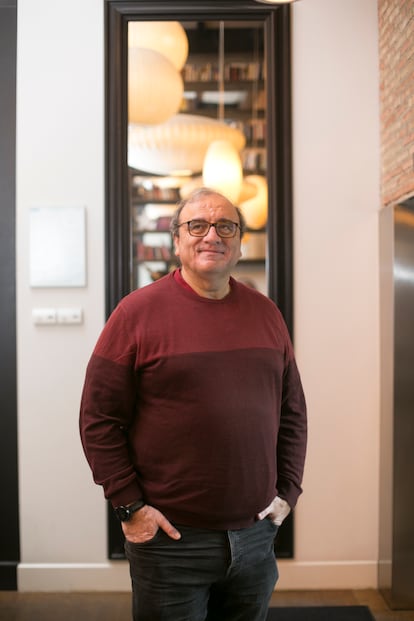Antonio Turiel, physicist: ‘We take for granted that we are going to replace fossil fuels with a 100% renewable system. That’s very questionable’
The scientist presents a new book in which he predicts drastic changes in Europe due to the lack of energy and materials


For physicist Antonio Turiel, 54, we’re heading towards a world in which there’ll be a step backwards in industry. Most produce will be sold locally, flying will become a luxury only accessible to a few and we’ll have to return to what he calls “rudimentary technologies,” such as water mills, or even human traction systems. These are some of the consequences that will result from a lack of energy and resources, according to this scientist from the Institute of Marine Sciences at the Spanish National Research Council (CSIC), who’s based in Barcelona. He has just published a new book, titled The Future of Europe: How to Reduce Growth for an Urgent Reindustrialization.
Question. Why are you still so concerned about the geological depletion of fossil fuels if science is asking us to cut out these energies as soon as possible due to climate change?
Answer. Because we’re not making an effective substitute. In fact, last year was the year in which the most gas and coal was extracted. We continue to have an economy that’s very dependent on fossil fuels. It’s absolutely necessary to get rid of them, but we’re not doing it.
Q. You say that the current model of expansion of renewable energies is a failure. Why?
A. In the case of wind power — apart from the issues of intermittence, which generate problems when it comes to guaranteeing the stability of a high-voltage network — the greatest difficulty is the cost. We’re facing a crisis like that of [the Spanish-German wind engineering company] Gamesa, which has stopped producing wind turbines because the 4.X and 5.X models are breaking down. In the case of photovoltaics — apart from the dependence on materials such as silver, which are beginning to become scarce — the problem lies in the fact that it’s a production of direct current, within an alternating current system. On the other hand, it has a [level of] production that’s heavily seasonal. The ideal would be to have a storage system, but that’s not viable, because it requires a lot of materials. It’s very difficult to think that we’re going to achieve an all-electric system, [especially when] we’re not talking about the shortage of copper. The electric car is falling apart on all fronts.
Q. How can we then explain why, in Spain, renewables already account for more than 50% of electricity generation and that coal has practically been eliminated?
A. Yes, this is true. But electricity is only 22% of final energy consumption. That is, 50% of 22% is only 11% of the total. Furthermore, we must keep in mind that, in Spain, what’s occurred is a decrease in electricity consumption and energy consumption in general. This is because, like the rest of the Western world, we’re immersed in a process of strong deindustrialization that — in the long-run — undermines the foundations of being able to make anything.
Q. You argue that there’s no viable alternative to fossil fuels. Hence, this requires a significant decrease in energy consumption in all areas.
A. The decrease in energy and raw materials is inevitable; this is a physical fact. It’s a fact that we’re already beginning to experience: we’ve seen a clear decrease in oil production — even more evident with diesel — and we’re going to have it when it comes to gas and coal. But there are also shortages of uranium, copper, silver, all materials. The decrease is inevitable, what we have to discuss is how we manage it. The proposal of degrowth is to try to do it in a democratic way, a way that guarantees the well-being of people.
Q. What are rudimentary technologies?
A. They’re technologies in which energy typically isn’t transformed; the mechanical impulse is directly used, or heat is directly used.
Q. What’s a bicycle washing machine?
A. A bicycle washing machine is what its name implies: a bicycle connected to a washing machine drum. Instead of using electricity, mechanical force is used. This is obviously a bit tiring, but with the traction capacity of a human being, you can do the same things as a washing machine without using electricity.
Q. For residences, you’re considering the use of human traction systems like this, or having solar cookers, or common areas for washing machines. Even kitchens where the refrigerator can be shared by various families. Isn’t that right?
A. Shared laundry areas are very common in many countries. This isn’t a new invention. With a single washing machine, you can serve many homes. It’s a more efficient way of using resources. In the case of refrigerators and stoves, it’s a bit of the same philosophy: trying to minimize the use of resources and energy, by taking into account that they can be used in shifts. It’s not easy — it implies a very important cultural change. But there are many ways of trying to make consumption sustainable.
Q. Isn’t it contradictory to give more weight to rudimentary technologies than to more modern ones, such as solar panels?
A. Solar panels have to be used. They have their uses at a domestic level. But the main problem we have is to what extent we can scale things up. When we talk about “rudimentary technologies,” we’re not saying that they have to replace the others, but rather that they have to complement them. If you intend to do everything with photovoltaic panels, you’ll encounter a lot of problems with managing the energy produced, managing the intermittency, dealing with the shortage of materials such as copper and silver, etc.

Q. You’ve written that maritime transport will, once again, be sail-powered. You’ve also affirmed that air travel is doomed to decline drastically, until it becomes negligible.
A. Well, it’s not that maritime transport has to be sail-powered, but that sails can be something that can be used. In fact, today, some freighters incorporate sails to gain half a knot, one knot, which means a certain amount of fuel savings. In some cases — especially in coastal navigation — it may make sense for the ship to simply be sail-powered and that’s it. On long-distance journeys, you can have some motor power, but the idea is to use the sail as much as possible.
Q. You also point out that, with all certainty, large retail markets will have to be located next to the railway nodes.
A. Historically, this is what has happened. From the evolution of markets from medieval times to the beginning of the 20th century, they tend to be close to the distribution lines, because you have to move a lot of materials. What you want is for it to be as efficient as possible. In a world where the railway is the best option for land transport — as I believe — there will logically be an intensification of the market around these nodes. Each city will have its own railway transport system and the market will be close to the place where the goods arrive.
Q. You say that mass tourism will disappear and that, in a few decades, tourist activity in Europe will be negligible.
A. This is difficult to avoid, for a very simple reason: travelling will be more expensive. It’s obvious. Apart from the fact that, if nothing is done, the path we’re following — as we’re seeing with the brutal deindustrialization in Germany and to a lesser extent France — is that people will have less disposable income. So, as tourism is a discretionary expense, there will obviously be less investment in tourism.
Q. You also predict a return to the countryside, a strong reduction in the size of industry and the end of the internet as we know it today. You write that everything will have to be simplified to meet more functional requirements.
A. Well, regarding the return to the countryside, what I say is that the percentage of people working in the primary sector will surely increase, but that doesn’t mean that they’ll be the majority. I won’t get into that, because there will surely be an increase, but it will depend a lot on the degree of mechanization in the countryside. Industry will have to shrink, because, right now, large volumes of everything are produced and this won’t be able to be maintained. We’ll have to prioritize what things we’ll be able to make, hence there’ll naturally be a contraction. If there are no materials or energy in the quantities that there were before, logically, there’ll have to be an adaptation, because the prices have to be acceptable.
As for the internet, there’s a very serious problem of unsustainability in the production of microchips. In fact, for years now, we’ve been observing that there’s beginning to be a fall in the production of laptops, smartphones, tablets, memory chips, etc.
Q. It’s surprising how forcefully you make these statements about the future.
A. We always take for granted that we’re going to replace fossil fuels with a 100% renewable system that will produce the same amount of energy, or an amount of energy with an equivalent transformative capacity. That’s very questionable.
Q. What I mean is that scientists are generally very cautious when it comes to making predictions about the future, at least when it comes to such complex matters.
A. My tone is the one being taken when it comes to most of the work being done right now on sustainability. If you look at the latest report on the state of the planet’s climate by [William J.] Ripple, the 14 most important environmental scientists in the world say that we’re heading for a planetary catastrophe that will endanger the continuity of human civilization. And, in general, when people discuss the problem of materials [and resources], they’re saying that there are very big challenges in the future. So, right now, the mood in the scientific world is that we’re approaching very serious problems.
Q. I’m not talking about the problems, which I’m sure are very serious. However, I’m surprised by the bluntness with which you refer to certain solutions and how you take very specific changes in the future for granted.
A. I don’t have the solution to these problems. What I’m saying is that there are certain things that can help. Additionally, we don’t have a precise estimate of the speed at which the changes will occur, nor with what intensity they’ll occur. What we do know is that we have some challenges ahead. Ignoring them and not facing them leads us to a situation of ever greater risk. We can argue about which are the most viable proposals and whether it would be better to do one thing or another, but as far as the challenges right now are concerned, they’re hardly questionable.
In any case, this is precisely what we have to debate. Let’s talk about what cannot be done and what can be done.
Q. But sometimes, you’re criticized for making very strong predictions that don’t pan out.
A. I’m sure I’ve been wrong about a lot of things. The funny thing is that the people who criticize me are so lazy that they don’t look for [whatever I’ve said that’s wrong], because they’re criticizing me for statements I haven’t made! This is pretty ridiculous, but it happens often. For example, they say: “You said we were going to run out of diesel.” Oh, when did I say that? Production has decreased. Just because it doesn’t affect Europe doesn’t mean it doesn’t affect Latin America. Look at the truckers’ strike in Colombia, or look at how, in Argentina — an oil-producing country — 20% of the harvest has been lost due to a lack of diesel. Or look at the situation in Nigeria, which, by the way, is the main oil supplier to Spain.
Obviously, I’m human. I have my biases, my perceptions and my mistakes. I know things I’ve said that are wrong, because I make mistakes, just like anyone else. This especially happens whenever you get carried away by your impression of a situation. You say: “this looks really bad.”
Sign up for our weekly newsletter to get more English-language news coverage from EL PAÍS USA Edition
Tu suscripción se está usando en otro dispositivo
¿Quieres añadir otro usuario a tu suscripción?
Si continúas leyendo en este dispositivo, no se podrá leer en el otro.
FlechaTu suscripción se está usando en otro dispositivo y solo puedes acceder a EL PAÍS desde un dispositivo a la vez.
Si quieres compartir tu cuenta, cambia tu suscripción a la modalidad Premium, así podrás añadir otro usuario. Cada uno accederá con su propia cuenta de email, lo que os permitirá personalizar vuestra experiencia en EL PAÍS.
¿Tienes una suscripción de empresa? Accede aquí para contratar más cuentas.
En el caso de no saber quién está usando tu cuenta, te recomendamos cambiar tu contraseña aquí.
Si decides continuar compartiendo tu cuenta, este mensaje se mostrará en tu dispositivo y en el de la otra persona que está usando tu cuenta de forma indefinida, afectando a tu experiencia de lectura. Puedes consultar aquí los términos y condiciones de la suscripción digital.








































